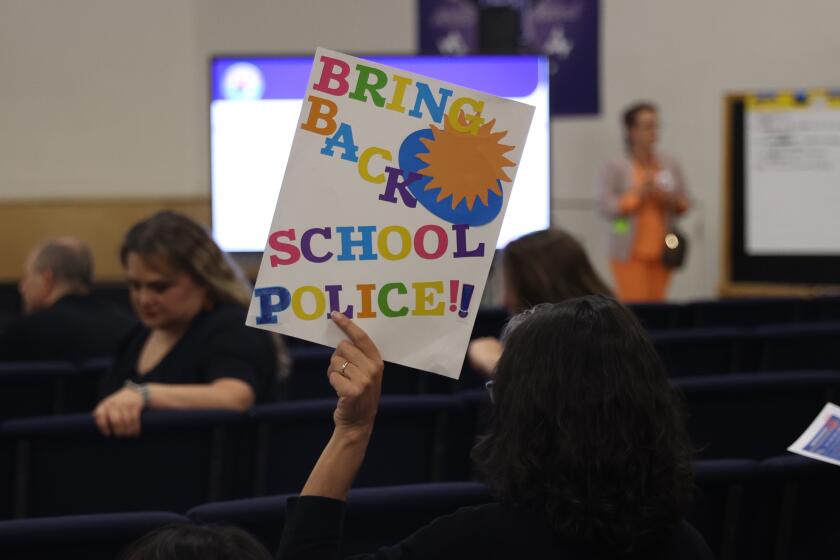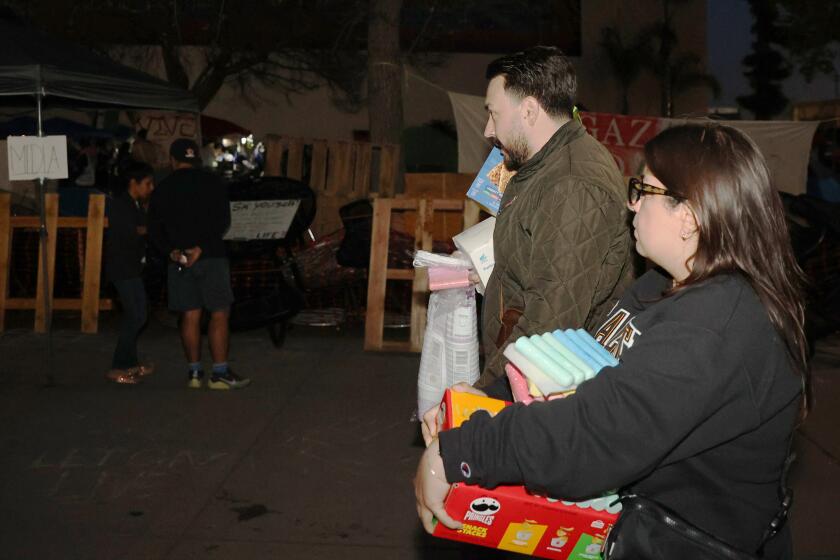‘Macho School’ Has New Leader and Perhaps New Image
Christine Wight knows her college has a reputation for being a “macho school.”
But she’s hoping that her election as Claremont McKenna College’s first woman student body president will change all that.
Wight, an economics major, won 54.2% of the 560 votes cast during elections last month at this small private college, formerly Claremont Men’s College. Also elected Feb. 20 were three female class presidents: Ingrid Morris, 20, senior; Laura Lulejian , 20, junior, and Beth Curtis, 19, sophomore. The freshman class elects its officers in the fall.
“What makes me really happy is that gender never came up in the election,” said Wight, a 21-year-old junior. “I do think, though, that this will dispel some of the negative image that people have of the school.
“I think this school has gotten a bad rap for being a macho school. But the years that I’ve been here, I’ve never felt it, and I don’t think it’s true.”
Claremont McKenna, one of the six Claremont Colleges, was founded in 1946; it did not admit women until 1976. Wight said the school’s image is based primarily on its past practice of excluding women.
“The climate was very different then,” agreed Yvette Rodick, a 1986 graduate who is now director of internship and community relations for the college. She also is adviser for the school’s Women’s Forum, an informal group that meets twice a month to discuss issues of concern to women. “The environment is much more supportive now,” she said.
Kathy Ormseth, 31, was part of the first class to attend Claremont McKenna after it opened its doors to women. She said she will never forget what it was like to be one of 60 women in the midst of 751 men.
“I remember the first night I went to the dining hall for dinner,” Ormseth recalled. “I sat down and looked around and I was the only woman in the hall surrounded by 300 men. . . . It was quite a feeling.
“The school definitely had a masculine flavor to it,” Ormseth continued. “They were not used to having women around. For example, there were no bathtubs in the school (dormitories), only group showers, which most women are not used to.”
Ormseth, now vice president of Union Bank’s San Jose Real Estate Loan Center, said it would have been “unlikely for a woman to be student body president at that time.”
“Society has changed a lot since I’ve graduated, and the fact the school has chosen its first female president is a reflection of that change,” Ormseth said. “Women, at that time, were still not fully accepted in positions of authority. . . . We were part of a changing era.”
The four newly elected presidents say they too are part of a changing era. “It has taken a long time before we reached this point, but progress takes time,” Morris said. “It’s finally here--people are beginning to be judged as individuals, not as males or females.”
Lulejian agreed, saying: “We were not elected because we are women, but because we are qualified to do the job.”
Despite the election, though, students are quick to point out that sexism exists in society and on campus as well.
Women are still under-represented at the college, known for its economics and government curricula. Women make up 37% of the 859-member student body. Last year, the school president appointed a six-member committee to look into sexism on campus, after an incident in which a paid stripper took off most of her clothes in a packed dining hall as a birthday present for one of the students.
“We have been surveying students, faculty and staff to get their feelings on sexism on campus,” said Rodick, who serves on the committee appointed by President Jack Stark. “We are still gathering data, but we do expect a report to be published in April.
“I can’t really say if sexism exists or doesn’t exist on campus,” she said. “But the more we talk about it, the better it’ll be for everyone.”
More to Read
Start your day right
Sign up for Essential California for news, features and recommendations from the L.A. Times and beyond in your inbox six days a week.
You may occasionally receive promotional content from the Los Angeles Times.





